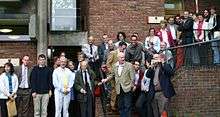Peter Ganz

Peter Felix Ganz (3 November 1920 in Mainz, Germany - 17 August 2006 in Oxford, England) was a German born Germanist who emigrated to Britain in 1938, translated conversations of German nuclear scientists during Operation Epsilon in 1945 and became a professor at the University of Oxford.
Early life and education
Peter Ganz was the son of Dr Hermann Friedrich Ignaz Ganz and Dr Charlotte (Lotte), née Fromberg. He attended the Realgymnasium in Mainz[1] but was forced to leave it since his family was classed as Jewish. In November 1938, he was held for six weeks in the concentration camp at Buchenwald but was then able to emigrate to England. After internment on the Isle of Man, he joined the Royal Pioneer Corps, then worked for the Combined Services Detailed Interrogation Centre (CSDIC) with Fritz Lustig.[2]
Career
At the end of the war he worked at Farm Hall listening to the captured nuclear scientists including Heisenberg, Otto Hahn and others as the atom bomb went off.
From 1948 to 1949 Ganz worked as assistant lecturer at Royal Holloway College, London and from 1949-60 as Lecturer in German Philology and Medieval Literature at Westfield College, London. From 1963 to 1972 he was a Fellow at Hertford College, Oxford, Professor of Medieval German Language and Literature and Fellow of St Edmund Hall, Oxford from 1972 to 1985 where his successor (until 2012) was Nigel F Palmer.
He was a Resident Fellow at the Herzog August Library, Wolfenbüttel from 1985 to 1988. He co-founded the Anglo-German Colloquium, a biennial meeting of British and German medieval Germanists, and edited the Oxford German Studies from 1978 to 1990 and the PBB from 1976 to 1990.
Personal life
In 1949, he married Rosemary Allen (died 1986). They had two sons: Adam Ganz (a writer who also wrote a play on his father's experiences at Farm Hall)[3] and David Ganz (until 2010 Professor of Paleography at King's College London),[4] and two daughters: Deborah Ganz and Rachel Ganz.[5] After Rosemary Allen's death, he married Nicolette Mout (Professor of Modern History at Leiden) in 1987.[6]
Orders and awards
In 1973, he received the Große Bundesverdienstkreuz in acknowledgement of his services in establishing scholarly exchange between English and German Germanists, and in 1993 an honorary doctorate of the Universität Erlangen-Nürnberg.[7]
Selected publications
- Der Einfluss des Englischen auf den deutschen Wortschatz (1957)
- Gottfried von Strassburg's Tristan (1978)
- editor: Dukus Horant
- editor: Burckhardt's lectures Über das Studium der Geschichte (1982, also as volume 10 of the Kritische Gesamtausgabe, 2000)
References
- ↑ "German newspaper article on the history of the Ganz family". Allgemeine-zeitung.de. Retrieved 25 October 2014.
- ↑ "News article on Fritz Lustig". Thejc.com. Retrieved 25 October 2014. and "Fritz Lustig's comment on a blog about Farm Hall". Ann Finkbeiner. Retrieved 1 January 2016.
- ↑ "Recording of the Radio Play Nuclear Reactions". Royalholloway.ac.uk. Retrieved 25 October 2014.
- ↑ John Crace. "Guardian Article on the Retirement of David Ganz". the Guardian. Retrieved 25 October 2014.
- ↑ "Obituary Independent". The Independent. Retrieved 25 October 2014.
- ↑ "Staff page Nicolette Mout at Leiden University". Hum.leiden.edu. Retrieved 25 October 2014.
- ↑ "Obituary in the Library News" (PDF). HAB Wolfenbüttel. Retrieved 25 October 2014.